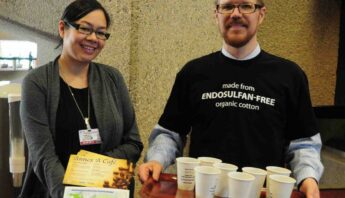It's Tuesday morning in Geneva, and there's lots of good news to report from the first full day of negotiations of the expert committee of the Stockholm Convention. As the parties consider whether to recommend a worldwide ban on the antiquated insecticide endosulfan, yesterday saw two more countries announce domestic bans. Prof. Masaru Kitano of Meiji University told the committee that the Japanese registration for endosulfan expired on September 29 and was not renewed, and then Ms. Kyunghee Choi of South Korea announced that all uses would be phased out in that country by December 2011.
This morning, we awoke to the quite unexpected news that Australia has decided to ban the pesticide. With the U.S., Canada, and Brazil deciding this summer to phase out endosulfan, Australia was the only large developed country standing by this dangerous pesticide. Endosulfan's defenders can no longer argue that it must be safe since advanced Western countries are still using it.
As was the case last year, endosulfan's main defender is India, the world's largest producer and exporter of endosulfan. But that may be changing. On Friday the Chief Minister of Kerala (roughly equivalent to a governor in the U.S.) sent a letter to Indian Prime Minister Manmohan Singh urging him to support endosulfan's inclusion in the Stockholm Convention. The same day, the state's environment minister, Binoy Viswam, sent a letter to the national environment minister Jairam Ramesh asking the same. Endosulfan was banned in Kerala following a mass poisoning of villagers in the Kasaragod district. While it's unlikely we'll see a complete reversal of India's position at this meeting, these fissures within the Indian government none-the-less bode well for the prospect of a global ban — an action that governments will take a final decision on next May if parties can agree at this meeting to recommend it.







